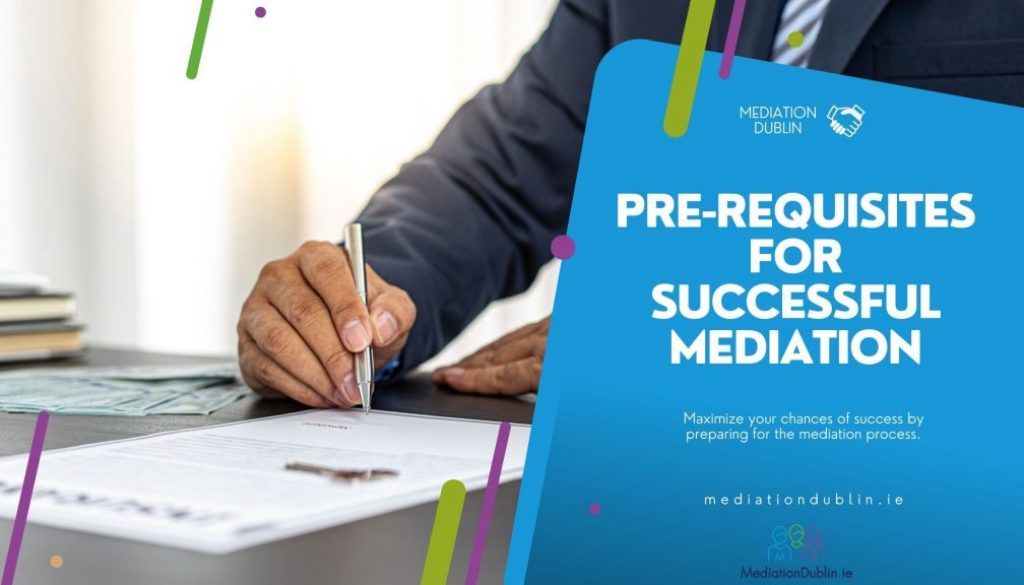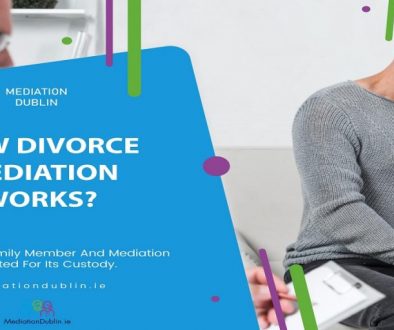Key Elements for Achieving Successful Mediation

Essential Pre-Requisites for Successful Mediation
Mediation can be a highly effective way to resolve disputes and reach agreements without the need for costly and time-consuming litigation. However, to make the most out of the mediation process, it is essential to come prepared with the right mindset and tools. In this post, we’ll outline the essential pre-requisites for successful mediation and provide strategies to help you prepare effectively.
Pre-Requisites for Successful Mediation
Successful mediation requires a combination of pre-requisites, including:
Willingness to Compromise
“Compromise is the best and cheapest lawyer.” – Robert Louis Stevenson
One of the essential pre-requisites for successful mediation is a willingness to compromise. Mediation is all about finding common ground and reaching a mutually acceptable agreement. Therefore, parties need to come to the table with an open mind and a willingness to give and take. Otherwise, the mediation process is unlikely to succeed and the dispute may end up in costly litigation.
Strategies to foster willingness to compromise include:
- Focusing on shared interests rather than positions
- Listening actively to the other party’s perspective
- Brainstorming creative solutions that benefit both parties
Good Faith Participation
“Mediation is the art of finding common ground.” – Karen Burrell
Another essential pre-requisite for successful mediation is good faith participation. Mediation requires parties to participate in good faith, meaning that they genuinely want to reach a resolution and are willing to engage in the process constructively. Without good faith participation, the mediation process is unlikely to succeed and the dispute may escalate.
Strategies to foster good faith participation include:
- Avoiding personal attacks and insults
- Focusing on the issue, not the person
- Acknowledging the other party’s perspective and feelings
Open Communication
“The single biggest problem in communication is the illusion that it has taken place.” – George Bernard Shaw
Open communication is another essential pre-requisite for successful mediation. Mediation relies on effective communication between the parties, including active listening and clear expression of thoughts and feelings. Without open communication, parties may misunderstand each other, and the mediation process may break down.
Strategies to foster open communication include:
- Using “I” statements to express thoughts and feelings
- Asking open-ended questions to clarify the other party’s perspective
- Summarising and paraphrasing to ensure mutual understanding
Preparation and Organization
“By failing to prepare, you are preparing to fail.” – Benjamin Franklin
Preparation and organisation are critical pre-requisites for successful mediation. Parties need to come to the mediation session well-prepared, including having all necessary documents and information organised and readily available. Lack of preparation and organisation can lead to delays and frustration, and may even undermine the credibility of the parties.
Strategies to foster preparation and organisation include:
- Creating an agenda for the mediation session
- Identifying and organising all relevant documents and information
- Anticipating potential questions or concerns and preparing responses in advance
Empathy and Understanding
“Seek first to understand, then to be understood.” – Stephen Covey
Empathy and understanding are essential pre-requisites for successful mediation. Parties need to be able to see the other party’s perspective and empathise with their feelings and needs. Without empathy and understanding parties may become entrenched in their positions and the mediation process may stall.
Strategies to foster empathy and understanding include:
- Reflecting on the other party’s perspective and needs
- Acknowledging the other party’s emotions and concerns
- Exploring underlying interests and needs to find common ground
Techniques and Strategies for Effective Mediation
In addition to the pre-requisites listed above, there are several techniques and strategies that a Mediator may use to conduct a successful mediation process. Some of these strategies include:
Building Rapport
“Rapport is the ability to enter someone else’s world, to make him feel that you understand him, that you have a strong common bond.” – Tony Robbins
Building rapport is an essential strategy for effective mediation. A Mediator needs to establish trust and rapport with the parties to create a safe and respectful environment for communication and negotiation. Without rapport parties may be hesitant to share their thoughts and feelings and the mediation process may not be as productive.
Strategies to build rapport include:
- Establishing a comfortable physical environment
- Demonstrating empathy and understanding
- Using active listening and reflective language
Encouraging Dialogue
“Dialogue is the most effective way of resolving conflicts.” – Dalai Lama
Encouraging dialogue is another critical strategy for effective mediation. A Mediator needs to create opportunities for the parties to communicate with each other and explore different perspectives and solutions. Without dialogue parties may become entrenched in their positions and the mediation process may not lead to a mutually acceptable agreement.
Strategies to encourage dialogue include:
- Using open-ended questions to facilitate discussion
- Encouraging active listening and reflective language
- Using visual aids and diagrams to illustrate complex ideas
Facilitating Negotiation
“The art of negotiation is not about winning or losing. It’s about creating a solution that satisfies all parties.” – Donna Martini
Facilitating negotiation is an essential strategy for effective mediation. A Mediator needs to help the parties identify areas of agreement and develop creative solutions that meet everyone’s needs. Without negotiation, the mediation process may not lead to a mutually acceptable agreement and the dispute may end up in litigation.
Strategies to facilitate negotiation include:
- Using brainstorming techniques to generate ideas
- Encouraging parties to explore underlying interests and needs
- Helping parties evaluate the pros and cons of different solutions
Ensuring Impartiality
“Impartiality is essential to the success of a Mediator.” – James Stovall
Ensuring impartiality is a crucial strategy for effective mediation. A Mediator needs to remain neutral and unbiased throughout the mediation process, to ensure that both parties feel heard and respected. Without impartiality, parties may become skeptical of the Mediator’s motives and the mediation process may not be successful.
Strategies to ensure impartiality include:
- Avoiding taking sides or showing favouritism
- Remaining objective and neutral throughout the mediation process
- Treating both parties with respect and dignity
Conclusion
In conclusion, successful mediation requires a combination of pre-requisites and effective strategies. Parties must come to the mediation process with a willingness to compromise, good faith participation, open communication, preparation and organisation, empathy and understanding. Additionally, a Mediator must use effective techniques such as building rapport, encouraging dialogue, facilitating negotiation and ensuring impartiality. By following these pre-requisites and strategies, parties can increase their chances of achieving a mutually acceptable agreement and avoiding costly and time-consuming litigation.


